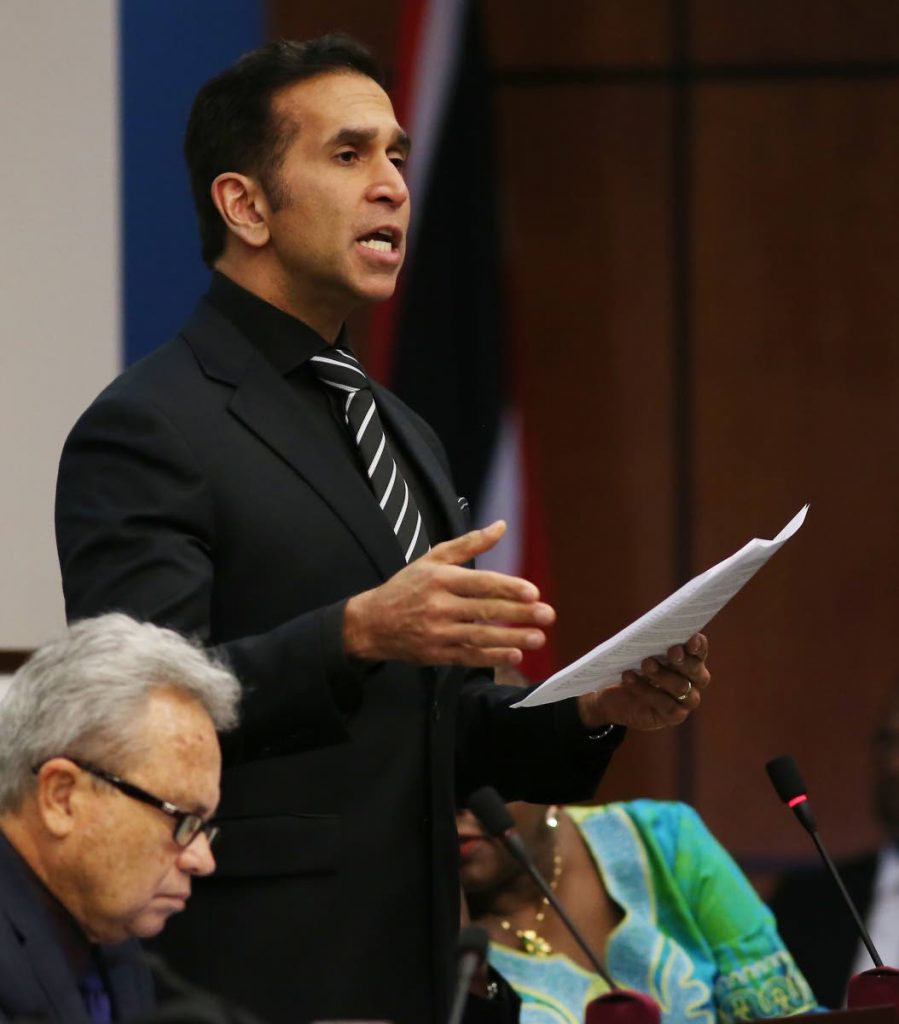AG: Keep ganja away from children

ATTORNEY General Faris Al-Rawi said legislation to decriminalise marijuana will allow for small amounts to be grown and used, but exposing children to it, except medicinally and with a certificate from a medical practitioner, will be a crime.
He was making a statement in the House on Friday.
Al-Rawi said that while others have flirted or failed in the 25 years since the passage of the Dangerous Drugs Act, he was pleased, as AG, to witness the introduction of two bills: the Dangerous Drugs (Amendment) Bill, 2019 and the Cannabis Control Bill, 2019.
"Together, these bills will amend the Dangerous Drugs Act and birth a new regulatory regime which will move our laws from a colonial, archaic past to the future."
He explained that the Dangerous Drugs (Amendment) Bill, 2019 seeks to define marijuana comprehensively as cannabis; to decriminalise certain quantities of cannabis and cannabis resin; to prohibit the use of the substance in public spaces, all educational institutions and places of work; and to abrogate the present prohibition of the administration of the substance to children in medical cases only.
He explained that with the Amendment Bill a person could now lawfully grow no more than four cannabis male plants at his residence and without a licence.
He also said under the tiered possession scheme, the bill proposes the abolition of the present regime whereby possession of any amount is an arrestable offence, but will establish lawful limits for possession and use.
Under the new scheme, a person found in possession of 30 grammes of cannabis or less will no longer be arrested for possession. The upper limit will be 60 grammes. People with charges before the court for the new upper limit may apply to be discharged and have their records expunged.
"This bill proposes that possession of more than 30 grammes, but not more than 60 grammes of cannabis, or more than five grammes but not more than ten grammes of cannabis resin, is to now be treated by a fixed-penalty ticket system, with the brunt of the law being applied only where there is a refusal to pay the fixed penalty, and only after the possibility of community service as an alternative remedy is explored."
Al-Rawi stressed that the bill strictly criminalises smoking or using cannabis or cannabis resin in a public place and acts involving children.
A person who possesses cannabis, even within the allowable limits, will be prosecuted for having the substance on a school bus or at school premises, and will be liable on summary conviction to a fine of $250,000 and to imprisonment for five years.
The bill also penalises people, who, whilst under the influence of cannabis, do anything which constitutes negligence, professional malpractice or professional misconduct. It prohibits anyone from operating, navigating, or being in physical control of any motor vehicle, aircraft, or ship whilst under the influence of the substance.
In both instances the conduct attracts a summary-conviction fine of $250,000 and imprisonment for five years.
He said that in addressing the reform of the criminal justice system, many have ignored the profound effect that decriminalisation of certain offences can have on the system.
He reported Judiciary data revealed that in the period 2007-2018, 84,668 cases came before the magistracy under the Dangerous Drugs Act for possession of marijuana, possession of marijuana for the purposes of trafficking, cultivation of marijuana and the gathering of marijuana. Of these, 71,964 were for possession of marijuana alone.
In the 2017/2018 law term, the Judiciary reported that 9,553 marijuana-related cases came before the magistrates' courts, with 8,316 being for possession of marijuana alone.
"Many of these cases relating to marijuana demonstrate that mostly poor and underprivileged men suffer the brunt of the hard side of the law, with 3,429 people having been remanded for marijuana-related offences in the period 2010-2018, being approximately 500 persons each year unable to access bail, even though granted bail by the courts."
Al-Rawi said the burden to the taxpayer of hundreds of millions of dollars expended in remand incarceration "is as atrocious as the effect to the lives of the accused and their families."
He added: "Convictions for possession of marijuana have derailed many lives as they stand as a bar to education, travel and employment."
Under the Cannabis Control Bill, a state entity – the TT Cannabis Authority – will be established to administer a licensing and registration regime to legitimise, establish accountability and transparency for the use of cannabis by persons and bodies engaged in religious sacramental, medicinal and commercial activities.
Al-Rawi also said there will be strict control of medicinal use and use for religious purposes, which the bill addresses separately addressed
The Cannabis Control Bill 2019 also protects children by criminalising certain activities involving children. Cannabis for medicinal use by children will require a certificate from the child's medical practitioner and it is also a criminal offence if a child allowed to use cannabis at a place of worship, a sacramental dispensary or at an exempt event.
"The benefits to the people of TT are so obvious, now that the work has been done and put into context," the AG said.


Comments
"AG: Keep ganja away from children"